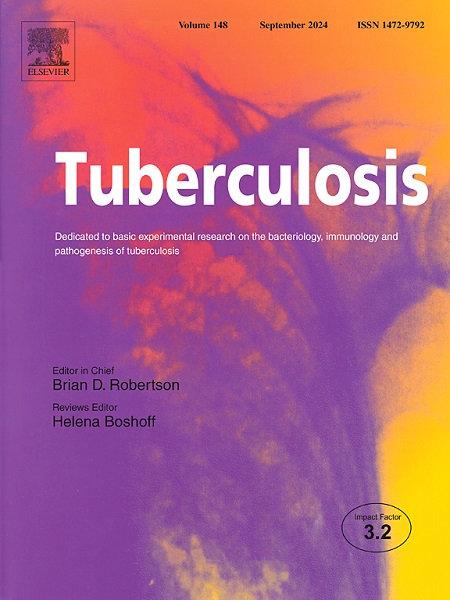继发于结核的海马综合征:从神经炎症到神经退行性变
IF 2.9
3区 医学
Q3 IMMUNOLOGY
引用次数: 0
摘要
由结核分枝杆菌(Mtb)引起的结核病(TB)仍然是全球主要的卫生问题,具有严重的长期后遗症。中枢神经系统结核(CNS-TB)是一种具有结核性脑膜炎和结核瘤等实体的临床谱。新出现的证据表明,结核分枝杆菌可能直接或间接影响海马体,一个重要的记忆、学习和认知结构。目的本综述旨在总结目前对结核分枝杆菌对海马体影响的生物学认识,阐明其在神经退行性变中的潜在作用,并介绍“结核分枝杆菌继发性海马体综合征(HSST)”作为CNS-TB谱中一种新的慢性实体的概念。方法通过文献综述,分析结核分枝杆菌如何进入大脑、嗜神经性以及对海马的神经炎症和神经退行性影响。对临床、组织病理学和实验研究的数据进行评估,以评估结核病与认知障碍之间的潜在联系。结果smtb可通过血液播散、“特洛伊木马”机制或通过嗅觉途径绕过血脑屏障(BBB)进入中枢神经系统。一旦进入大脑,结核分枝杆菌就会引起慢性神经炎症并破坏海马结构。研究表明,结核病增加了患阿尔茨海默病和帕金森病的风险,有证据表明,结核病会导致β淀粉样蛋白积累和神经元损失。此外,特定的结核分枝杆菌菌株表现出嗜神经性,并产生促进中枢神经系统侵袭的毒力因子。结论了解结核与神经认知障碍之间的相互作用对改善结核后护理至关重要。认识到HSST是CNS-TB谱系中的一种慢性疾病,可能有助于早期诊断和有针对性的干预,以减轻长期的神经系统后果。本文章由计算机程序翻译,如有差异,请以英文原文为准。
Hippocampal syndrome secondary to tuberculosis: From neuroinflammation to neurodegeneration
Background
Tuberculosis (TB), caused by Mycobacterium tuberculosis (Mtb), remains a primary global health concern, with significant long-term sequelae. Central nervous system TB (CNS-TB) is a clinical spectrum with entities such as tuberculous meningitis and tuberculomas. Emerging evidence suggests that Mtb may directly or indirectly affect the hippocampus, a critical memory, learning, and cognition structure.
Objectives
This review aims to summarize the current biological understanding of Mtb's impact on the hippocampus, elucidate its potential role in neurodegeneration, and introduce the concept of “Hippocampal syndrome secondary to tuberculosis (HSST)" as a novel chronic entity within the CNS-TB spectrum.
Methods
A comprehensive literature review was conducted to analyze how Mtb gains access to the brain, its neurotropism, and the resulting neuroinflammatory and neurodegenerative effects on the hippocampus. Data from clinical, histopathological, and experimental studies were evaluated to assess potential links between TB and cognitive impairment.
Results
Mtb can access the CNS through hematogenous dissemination, the “Trojan Horse” mechanism, or via the olfactory pathway, bypassing the blood-brain barrier (BBB). Once in the brain, Mtb induces chronic neuroinflammation and disrupts hippocampal structure. Studies suggest that TB increases the risk of Alzheimer's and Parkinson's diseases, with evidence of Mtb-driven amyloid-beta accumulation and neuronal loss.
Furthermore, specific Mtb strains exhibit neurotropism and produce virulence factors that facilitate CNS invasion.
Conclusions
Understanding the interaction between TB and neurocognitive disorders is critical for improving post-TB care. Recognizing HSST as a chronic condition within the CNS-TB spectrum may support early diagnosis and targeted interventions to mitigate long-term neurological consequences.
求助全文
通过发布文献求助,成功后即可免费获取论文全文。
去求助
来源期刊

Tuberculosis
医学-呼吸系统
CiteScore
4.60
自引率
3.10%
发文量
87
审稿时长
49 days
期刊介绍:
Tuberculosis is a speciality journal focusing on basic experimental research on tuberculosis, notably on bacteriological, immunological and pathogenesis aspects of the disease. The journal publishes original research and reviews on the host response and immunology of tuberculosis and the molecular biology, genetics and physiology of the organism, however discourages submissions with a meta-analytical focus (for example, articles based on searches of published articles in public electronic databases, especially where there is lack of evidence of the personal involvement of authors in the generation of such material). We do not publish Clinical Case-Studies.
Areas on which submissions are welcomed include:
-Clinical TrialsDiagnostics-
Antimicrobial resistance-
Immunology-
Leprosy-
Microbiology, including microbial physiology-
Molecular epidemiology-
Non-tuberculous Mycobacteria-
Pathogenesis-
Pathology-
Vaccine development.
This Journal does not accept case-reports.
The resurgence of interest in tuberculosis has accelerated the pace of relevant research and Tuberculosis has grown with it, as the only journal dedicated to experimental biomedical research in tuberculosis.
 求助内容:
求助内容: 应助结果提醒方式:
应助结果提醒方式:


